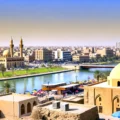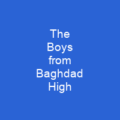Discovering Iraq: A Land of Ancient Wonders
Imagine a land where history whispers through the ages, where ancient cities rise from the fertile plains between the Tigris and Euphrates rivers. Welcome to Iraq, officially known as the Republic of Iraq. This West Asian country, with its rich cultural heritage and diverse population, has been at the heart of human civilization for millennia. From the cradle of civilization to modern-day challenges, Iraq’s story is a testament to resilience and innovation.
The Cradle of Civilization
How could one not be fascinated by the birthplace of early cities, civilizations, and empires like Sumer, Akkad, and Assyria? Mesopotamia, as this region was known, saw the invention of writing systems, mathematics, navigation, timekeeping, a calendar, astrology, the wheel, sailboats, and even a law code. These innovations laid the foundation for much of what we know today.
From Islamic Golden Age to Modern Times
Baghdad, once the capital of the Abbasid Caliphate, was a global cultural and intellectual hub during the Islamic Golden Age. The House of Wisdom, established in Baghdad, became a center for learning, attracting scholars from across the world. However, after the Mongol invasion in 1258, the region faced a prolonged decline due to plagues and successive empires.
Modern Iraq: A Nation on the Rise
Since independence in 1932, Iraq has experienced both growth and conflict. The country’s history is marked by significant economic and military growth alongside periods of instability and conflict. The Ba’ath Party took power in 1968, establishing a one-party state under Saddam Hussein, who launched wars against Iran and Kuwait.
Following the U.S.-led invasion in 2003, Iraq faced an insurgency and sectarian violence. Today, it is considered an emerging middle power, with a diverse population, geography, and wildlife. Most Iraqis are Muslim, while significant minorities include Christians, Yazidis, Yarsanism, and Jews.
Geography and Climate
The landscape of Iraq is as varied as its history, from the fertile plains to the arid deserts. Half of the country’s farmland is at risk of desertification, while nearly 40% has been overtaken by blowing desert sands that claim tens of thousands of acres of arable land every year. The climate is hot and arid, with summer temperatures frequently exceeding 48°C (118.4°F).
Modern Challenges and Opportunities
Climate change poses significant challenges to Iraq, exacerbating water scarcity, droughts, and increasing demand on the electrical grid. The government faces systemic pressures from climate change, fuel shortages, corruption, and sectarian conflict, which have driven terrorism and conflicts. However, there are signs of hope: a ‘Iraqi vision for climate action’ was announced in 2023, focusing on promoting clean energy, new irrigation projects, and reducing industrial gas flaring.
Economy and Infrastructure
Despite challenges, Iraq has shown positive signs of recovery. The country is an oil-rich upper-middle-income nation, with the oil sector providing 92% of foreign exchange earnings. However, infrastructure projects are ongoing, addressing issues like housing shortages and water access.
Culture and Heritage
Iraq’s culture is a rich tapestry woven from ancient traditions and modern innovations. The country boasts diverse ethnic groups, including Arabs, Kurds, Turkmen, Yazidis, Assyrians, Armenians, Mandaeans, and more. The architecture of Iraq reflects its long history, with historic mosques, old churches, and synagogues in the capital city of Baghdad.
Education and Healthcare
Education and healthcare are critical sectors for Iraq’s future. The government has launched initiatives to address overcrowding and triple shifts in schools, aiming to build 1,000 new schools with support from China and the private sector. The Ministry of Health is also constructing new hospitals and specialized centers.
Conclusion
As Iraq continues its journey towards stability and prosperity, it remains a land of ancient wonders and modern promise. From the cradle of civilization to the challenges of today, Iraq’s story is one of resilience and innovation. As we look forward, there are reasons for optimism as the country works to rebuild and thrive.

You want to know more about Iraq?
This page is based on the article Iraq published in Wikipedia (retrieved on March 2, 2025) and was automatically summarized using artificial intelligence.






